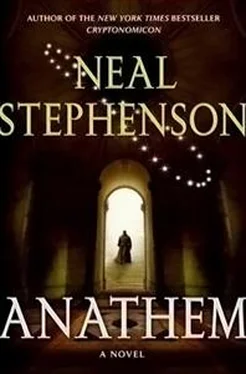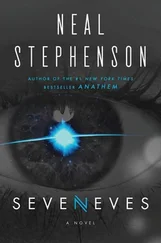Quin looked dismayed for a moment. Then his face relaxed as he understood that I was talking about dying of old age. “Where are you going to get the stone from?” he asked. “All I see is mud.”
I stopped and turned back to face the crater. It had filled with water as soon as it had cooled down, and so, with the altitude we’d already gained, we could easily see its general shape: an ellipse, oriented northwest to southeast—the direction in which the rod had been traveling. We were above its southeastern end. Its most obvious feature was an island of rubble that rose from the brown water a few hundred yards offshore. But I directed his attention to a barely visible notch in the coastline, miles away. “The river that filled it spills in over yonder, near the other end,” I said. “It’s not easy to make out from here. But if you go up that river a couple of miles, you come to a place where the impact touched off a landslide that exposed a face of limestone. Enough for our descendants to build whatever they want.”
Quin nodded, and we resumed climbing. He was silent for a while. Finally he asked, “Are you going to have descendants?”
I laughed. “It’s already happening! People started getting pregnant during the Antiswarm. We started eating normal food and the men stopped being sterile. The first avout baby was born last week. I heard about it on the Reticulum. Oh, you’ll find our access is a little spotty. For a while Sammann—he’s our ex-Ita—was keeping it running all by himself. But more ex-Ita show up here every day. We have a couple of dozen now.”
Quin wasn’t interested in that part of it. He interrupted me: “So, Barb could one day be a father.”
“Yes. He could.” Then—better late than never—I worked out the implication: “You could be a grandfather.”
Quin picked up the pace—suddenly eager to get Saunt Orolo’s constructed now . Huffing along in his wake, I added: “Of course, that raises the ancient breeding issue. But we know enough now that we can prevent a forking of the race into two species. It puts some responsibility on us to make places like this welcoming for what we used to call extras.”
“What are you going to call them—us—now?” Quin asked.
“I have no idea. What matters is that, under the Second Reconstitution, there are two coequal Magisteria. People can come up with words for them later.”
We had reached a place where the crater’s formerly knifelike edge had already softened to a round shoulder under the action of rain and wind. It was dotted with a few opportunistic weeds and etched with colored lines strung between stakes. “The boundaries will run wherever we put them. Here’s one.” I plucked at a red string.
Quin was aghast. “How can you just do that? Go out and stake a claim? The lawyers must be going crazy.”
“We have a small army of Procians running their mouths for us. The lawyers don’t stand a chance.”
“So everything on this side of the string is your property?”
“Yes. The walls will run parallel to it, just inside.”
“So you’ll still have walls?”
“Yes. With gateways—but no gates,” I said.
“Then why bother building the walls?”
“They have symbolic content,” I said. “They say, ‘you’re passing into a different Magisterium now, and there are certain things you must leave behind.’” But I knew I was not being altogether forthright. Half a mile away I could make out half a dozen people in bolts, peering through instruments and pounding in stakes: Lio and the crowd of ex-Ringing Vale avout he ran with now. I knew exactly what they were discussing: when war breaks out between the Magisteria and we plug the holes in the wall with gates, we’ll want interlocking fields of fire between this bastion and the next to repel any assault on the intervening stretch of wall…
I whistled between my fingers. They looked over at us. I pointed to the bundles of stakes that Quin and I had just dropped. A couple of the Valers began sprinting to fetch them. Quin and I turned to descend the way we’d come. But we were pulled up short by an answering whistle, which I recognized as Lio’s. I looked his way. He gestured down the outer slope of the crater wall, trying to get me to see something. There wasn’t much to reward looking: just a long slope of boiled earth, burned wood, shredded insulation, and pulverized stone. Farther away, a flat place where pilgrims like Quin had parked their vehicles. Finally, though, I saw what Lio wanted me to see: a vein of yellow starblossom rushing up the slope.
“What is it?” Quin asked.
“Barbarian invasion,” I said. “Long story.” I waved to Lio.
Quin and I turned around and began the descent into the crater. We had enough time to go on a detour to a certain terrace that my Edharian fraas and suurs and I had built soon after we had come to this place. Unlike most of the terraces, which were beginning to sprout plants that would eventually grow up into tangles, this one was covered with scrap-metal trellises that would one day support library vines. Some months ago, Fraa Haligastreme had paid us a visit from Edhar, and he’d brought with him root stock from Orolo’s old vineyard. We’d planted it in the ground beneath these trellises, and since then visited it frequently to see whether the vines, in a fit of pique, were committing suicide. But they were sending out new growth all over the place. We were near the equator, but almost two miles high, so the sun was intense but the weather was cool. Who would’ve thought that rockets and grapevines liked the same sorts of places?
As we were walking back down to the lake’s edge, Quin—who had been silent for a while—cleared his throat. “You mentioned that there were certain things you have to leave behind when you enter this new Magisterium,” he reminded me. “Does that include religion?”
One measure of how much things had changed was that this didn’t make me the least bit nervous. “I’m glad you brought that up,” I said. “I noticed that Artisan Flec came with you.”
“Flec’s been going through rough times,” Quin wanted me to know. “His wife divorced him. Business hasn’t been so good. The whole Warden of Heaven thing sent him into a tailspin. He just needed to get out of town. Then, Barb spent the whole drive, er…”
“Planing him?”
“Yeah. Anyway, I just want to say, if his presence here is not appropriate…”
“The rule of thumb we’ve been using is that Deolaters are welcome as long as they’re not certain they’re right,” I said. “As soon as you’re sure you’re right, there’s no point in your being here.”
“Flec’s not sure of anything now,” Quin assured me. Then, after a minute: “Can you even have an Ark, if you’re not sure you’re right? Isn’t it just a social club, in that case?”
I slowed, and pointed to an outcropping of bedrock that protruded from the curving wall of the crater. Smoke was braiding up from a fire that had been kindled on its top, before the entrance of a tent. My fraa was up there burning his breakfast. “Flec should hike up to Arsibalt’s Dowment,” I suggested. “It is going to be a center for working on that sort of thing.”
Quin made a wry grin. “I’m not sure if Flec wants to work on it.”
“He just wants to be told ?”
“Yes. Or at least, that’s what he’s used to—what he’s comfortable with.”
“I have a few Laterran friends now,” I said, “and one of them, the other day, was telling me about a philosopher named Emerson who had some useful upsights about the difference between poets and mystics. I’m thinking that it’s just as applicable in our cosmos as it is in his.”
Читать дальше





